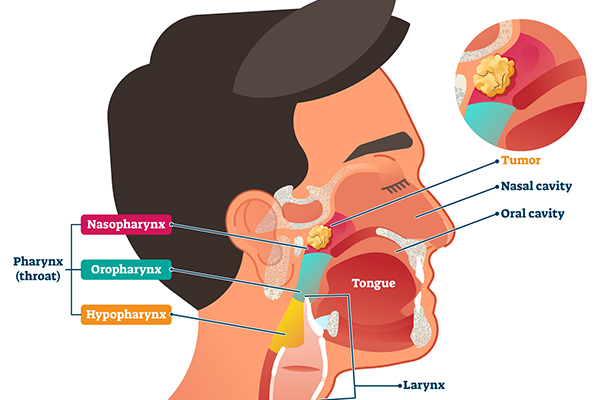Pediatric Nasopharyngeal Carcinoma
What is nasopharyngeal carcinoma?
Nasopharyngeal carcinoma is rare cancer occurring in the nasal cavity and the pharynx (the upper part of the throat behind the nose).
Nasopharyngeal carcinoma is more common in adolescents than in younger children. This rare cancer has no distinguishing symptoms and may take time to detect and diagnose. If left untreated, nasopharyngeal cancer metastasize or spread to other body parts, leading to death.
What causes nasopharyngeal carcinoma in children?
The exact causes of nasopharyngeal carcinomas are unknown; however, the Epstein-Barr virus (EBV), a common herpes virus, has been associated with this type of cancer.
What are the types of nasopharyngeal carcinoma in children?
There are three types of nasopharyngeal carcinoma classified by the World Health Organization: WHO-1, WHO-2, and WHO-3 (most common in children).
What are the symptoms of nasopharyngeal carcinoma in children?
Children with nasopharyngeal carcinoma often have these symptoms:
-
- Nosebleeds
- Nasal congestion, discharge, and blockage
- Frequent ear infections
- Enlarged or swollen lymph nodes in the neck and throat
- Sore throat
How is nasopharyngeal carcinoma diagnosed in children?
Your pediatrician may recommend one or more of the following tests:
-
- Blood tests: to measure EBV antibody levels in the blood
- Nasal endoscopy: to evaluate the nasopharynx
- Diagnostic imaging: CT scan, MRI, and a PET scan to check for a nasopharyngeal tumor
- Biopsy: to collect a tissue sample for lab testing for cancer
Treatments for nasopharyngeal carcinoma in children
A combination of chemotherapy and radiation therapy is most effective. Depending on the stage of cancer and the patient’s health, they may have one of the following treatments:
-
- Radiation therapy: radiation directed to the tumor
- Brachytherapy: tiny internal implants that release radiation near the tumor
- Chemotherapy: oral or intravenous cancer-killing medicine
- Targeted therapy: oral or intravenous drugs that focus on cell changes
- Surgery: to remove cancerous lymph nodes


